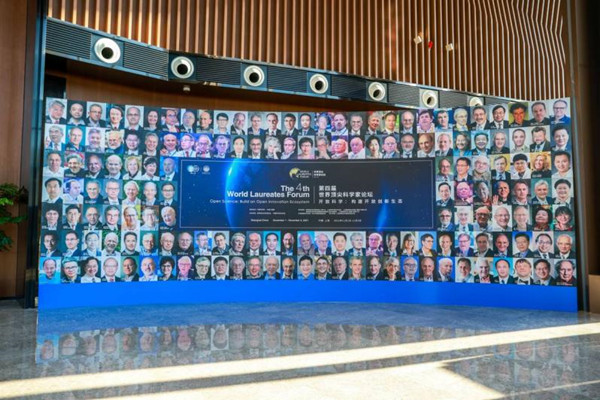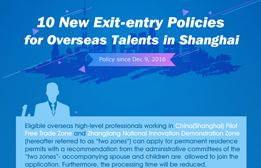Scientists urge more cooperation at 4th World Laureates Forum

The fourth World Laureates Forum kicked off in the Lin-gang Special Area of the China (Shanghai) Pilot FTZ on Nov 1, with top scientists from around the world sharing their views on the most pressing global issues. [Photo provided to chinadaily.com.cn]
The fourth World Laureates Forum ran from Nov 1 to 3 in East China's Shanghai. Due to the global COVID-19 pandemic, this year's event was held in both online and offline venues.
Launched by the World Laureates Association (WLA) in 2018, the forum is the world's largest gathering of top scientists, and a key platform for top scientists from across the world. It aims to provide an important platform for high-level dialogue in the international scientific community, while also striving to promote international cooperation and giving full support to young talents.
This year's forum, which had the theme of "Open Science: Building an Open Innovative Ecosystem," was attended by 131 world science award winners, including 68 Nobel Prize laureates. The event also attracted hundreds of academicians, top scientists, and young representatives from China.
The WLA and the China Association for Science and Technology, which jointly hosted the three-day event, said that this year's forum had the largest number of participants since the inaugural forum was held in 2018.
The top scientists agreed that this forum was dedicated to enhancing communication among scientists, between scientists and governments, as well as between scientists and the public.
During the forum, scientists shared their views on some common global challenges facing humanity today, such as climate change, food shortage, energy crisis, and biodiversity loss against the backdrop of the COVID-19 pandemic. In the face of crises and challenges, scientists called for more global cooperation and worldwide efforts to build an open and innovative ecosystem to achieve sustainable development, they said.
More than 100 conferences, themed sub-forums, roundtable discussions, and private seminars were held over the three days.
A conference themed on carbon peaking and carbon neutrality goals was held for the first time at the event, which covered four themed sub-forums - climate change and biodiversity, dual carbon governance, CCUS (carbon capture, utilization, and storage) and circular economy, as well as the development of future energy.
Topics related to healthcare were discussed at the forum, with medical experts sharing their views on cancer treatment, gene testing, women and children's health, as well as healthcare for seniors. Scientists also exchanged views on the challenges related to digitization development.
A number of special forums were also held at this year's forum, such as the WLA University Presidents Forum, the WLA Hospital Leaders Forum, and the WLA SHE Forum.
More than 10 Chinese scientists made addresses at the event, providing insights into China's approaches and experiences. They included: Ye Shuhua, an astronomer and member of the Chinese Academy of Sciences (CAS); Zheng Xiaojing, an academician of CAS and executive vice-president of the China Association for Women Scientists; Gong Qihuang, academician of CAS and executive vice-president of Peking University; Xu Ningsheng, academician of CAS and president of Fudan University; Wu Zhaohui, academician of CAS and president of Zhejiang University (ZJU); Yang Wei, academician of CAS and a professor at ZJU; as well as Chen Saijuan, academician of the Chinese Academy of Engineering and president of the Shanghai Association for Science and Technology.
Despite the ongoing COVID-19 pandemic, a number of the world's top scientists were physically present. They included: Roger Kornberg, chairman of the WLA and the 2006 Nobel Prize winner in chemistry; Michael Levitt, vice-chairman of the WLA and the 2013 Nobel Prize winner in chemistry; John Edward Hopcroft, winner of the 1986 Turing Award; Wang Zhonglin, the 2018 ENI award in Energy Frontiers winner and foreign member of the Chinese Academy of Sciences; as well as Michael Shepard, winner of the Lasker Award in 2019.
Kornberg said that basic science is open through means including publications and meetings, but there needs to be an improvement in the publication process to accelerate and improve access to information as the body of knowledge grows rapidly.
"For example, for the natural and social sciences journal Annual Reviews, of which I'm on the editing board, we're mulling providing free subscriptions for more readers in need," he said.
A new prize named the WLA Prize was unveiled at the opening ceremony of the forum, aiming to award scientists from around the world for their outstanding contributions to their industries. The prize was launched by WLA, carried out by the Shanghai World Laureates Development Foundation, and donated by the investment firm Sequoia Capital China, which has pledged to donate 500 million yuan ($78.2 million) to the prize purse.
The prize will start being awarded annually from 2022, focusing on two fields: mathematics and intelligent science, as well as medicine and life science. The winners of each field will be awarded 10 million yuan. The WLA will set up committees for prize management, selection, and review.
Wan Gang, chairman of the China Association for Science and Technology, made a keynote speech at the forum. He said that the Chinese scientific and technological community has always acted as an advocate of global openness and cooperation, an active part in global scientific and technological governance, as well as a contributor to innovations in global science and technology.
"Chinese scientific and technological development will target global sci-tech frontiers, serve major economic areas, strive to fulfill the significant needs of the country, as well as benefit people's lives and health," Wan said.
"Chinese scientists will further promote scientific exchanges, stimulate scientific and technological innovation vitality, as well as team with the international scientific community to address common challenges to humanity."
Wan added that the COVID-19 pandemic is undergoing many twists and turns, including the constant mutations of the virus. "Controlling the pandemic still poses a difficult challenge, while global economic recovery is still on shaky ground. The new round of technological revolution and industrial transformation is gaining momentum, and global society is more and more willing and motivated to address challenges like the COVID-19 pandemic, climate change, and carbon neutrality through joint efforts," he said.
Wan also gave a very positive outlook for the development of artificial intelligence (AI), which has evolved to include integrated technology and swarm intelligence.
"Open communication of observations and ideas is the source of progress. International communication, through speech and publication, leads to testing and validation, then to the elimination of errors, and then to application," said Levitt.
"Open communication of science also builds trust among scientists in different countries and enhances interactions across different areas of science. Increasingly, solutions of problems in one area are found through the use of ideas and methods from another," he said.
Levitt said that his research, which eventually won the Nobel Prize, was intertwined with breakthroughs in basic science across many fields. It was a result of both the crossover of biophysics and chemistry, as well as the help of enhanced computing that led to the first computer simulation of protein folding.
Levitt stressed that scientists need to put more focus on basic science research. He also encouraged long-term input in scientific research and development, as well as in fostering talent. "We should eliminate bureaucratism and remove the sense of hierarchy to provide more opportunities to young talent," he said.
"Establishing priority is incredibly important in science. Without priority, there is no openness. I think in the new ecosystem that will be open science, we will have a new tool for establishing priority. It's blockchain," Levitt added.
"In blockchain, if you are not first, everyone knows you are not first. Computers are spending all the time to check what you did against what was already done. This establishment of priority will be incredibly important for science going forward by ensuring that while the person who did it first may not necessarily get money, nor royalties, they do get the credit," said Levitt.
Professor Hopcroft noted that colleges and universities should change their evaluation systems, as well as pay more attention to teaching quality, which will help improve talent training.
Hopcroft has a long history in teaching, engaging in the reform and exploration of computer talents training in Chinese universities over the past 10 years. He said that although there are many outstanding universities in China and that they can cultivate world-class undergraduate talents, there is room to further train more high-quality talents. He suggested that Chinese universities should improve the teaching quality for all students.
"Some Chinese universities and colleges have successfully explored ways to set up discussion mechanisms to help teachers better conduct their work," he said. Hopcroft noted that China is committed to building world-class universities and that he believed that Chinese universities will soon make great progress.
"Looking at the world at large, all countries in the world are facing their own education problems and we should also communicate and cooperate with each other at the global level to better cultivate talents," he said.
Hopcroft also emphasized the importance of science communication. "People's understanding of science, or lack of it, will have a profound impact on the world. Both scientists and governments should try to find effective ways to promote the popularization of science," he said.
"At present, the number of publications and meetings has greatly increased, but the traditional way of education is no longer suitable, so we need to find new ways to promote the popularization of science to the public and to foster academic exchanges between scientists."

 Print
Print Mail
Mail




